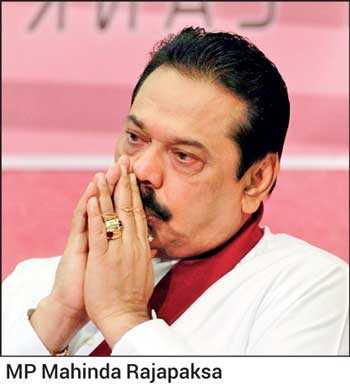Thursday Feb 26, 2026
Thursday Feb 26, 2026
Saturday, 24 November 2018 01:06 - - {{hitsCtrl.values.hits}}
 122 MPs file individual affidavits in Court that they voted to pass NCM against Mahinda
122 MPs file individual affidavits in Court that they voted to pass NCM against MahindaDelivering another Friday night twist to the ongoing political turmoil, 122 members of Parliament filed legal action yesterday, challenging the authority of former President Mahinda Rajapaksa to hold office as Prime Minister, after a no confidence motion was passed against him in the House.
All 122 MPs – comprising members of the UNF, JVP and TNA – filed an application for a Writ of Quo Warranto against the former President, who was controversially appointed Prime Minister by President Maithripala Sirisena on 26 October. Legal experts have called the appointment an unconstitutional and illegal power grab.
The Quo Warranto Writ challenges former President Rajapaksa to prove on what authority he holds office as Prime Minister after the legislature voted twice to defeat him on 14 and 16 November.
Translating literally to ‘By what authority’, the Writ Quo Warranto, if granted, has power to declare that the person challenged was not entitled to hold that office, lawyers said. The application [CA (Writ) 263/2018] has cited 49 respondents, including Mahinda Rajapaksa, the entire Cabinet of Ministers, State Ministers and Deputy Ministers.
In their application, the Petitioners state that Parliament passed a vote of no confidence against the purported Government, with all Petitioners voting in favour. Hansard copies have been annexed as proof of this claim, along with 122 individually signed affidavits submitted to Court, Daily FT learns.
A second Writ Quo Warranto application [CA (Writ) 262/2018] has been filed by Professor Sarath Wijesuriya, convenor of the National Movement for a Just Society. Both applications are likely to be taken up at the Court of Appeal early next week. In both applications, Petitioners have requested immediate interim relief to restrain Mahinda Rajapaksa from functioning as PM, which, if granted, could cripple the de facto Government.
“We have taken another decisive step in the struggle to defeat the Sirisena-Rajapaksa faction by filing the Writ Quo Warranto in the Court of Appeal,” said UNP MP Ajith P. Perera last night.
The legal action is the latest manoeuvre to challenge the legitimacy of the controversially appointed Prime Minister after he suffered a series of setbacks this past week. On 13 November, the Supreme Court issued an order suspending a presidential Gazette dissolving Parliament and calling snap elections, which the new regime hoped would end the political deadlock after it failed to secure a parliamentary majority.
Then the Rajapaksa faction lost a string of votes in Parliament – two no faith motions, a vote on a speech delivered by Rajapaksa on 15 November, and a vote taken in the House yesterday, which allowed parties opposing Mahinda Rajapaksa’s appointment as Premier to secure control of a key parliamentary select committee.
Yesterday’s vote was conducted electronically without disruptions after the UPFA staged a walkout, citing bias on the part of the Speaker, who refused to give the purported ruling alliance a majority on the important legislative committee. A total of 121 MPs voted in favour of the Speaker’s nominees to the 13 member committee.
Yesterday marked one month since the country was plunged into crisis after President Sirisena summarily sacked Prime Minister Ranil Wickremesinghe and replaced him with the former President. Wickremesinghe has refused to leave the official Prime Ministerial residence, Temple Trees, maintaining that his removal was illegal and in violation of the Constitution.
The application also states that on 15 November, Parliament convened again and the Speaker stated that in view of the no confidence vote passed the previous day, there was no Government and that he did not recognise Mahinda Rajapaksa as Prime Minister. The application states that Parliament passed a second vote of no confidence on 16 November, reaffirming the vote on 14 November, because the respondents had continued to function in office. The Writ contends therefore that under Article 48 of the Constitution, Cabinet stood dissolved from 14 November. Yet the Petitioners informed court that Mahinda Rajapaksa and the Cabinet continues to hold out that they are the Prime Minister and Cabinet of Ministers, respectively, by their conduct within and outside Parliament. “The Petitioners therefore seek mandates in the nature of Writs of Quo Warranto to require the respondents to show by what authority they claim to function as Prime Minister and Cabinet Ministers, respectively,” the petition states. They argue that grave and irreparable loss, damage and harm would be caused to the Petitioners, all citizens of Sri Lanka and the Republic if the interim reliefs were not granted by the Court. “The fate of the Republic is at risk, given the manner in which the Respondents have seized State power unconstitutionally, and the purported Government without a parliamentary majority will be unable to pass a Budget, authorise appropriations, carry a Statement of Government policy or pass any legislation. “In short, the conduct of the Respondents would result in an imminent shutdown of the entire State,” the petition before the Court of Appeal states.